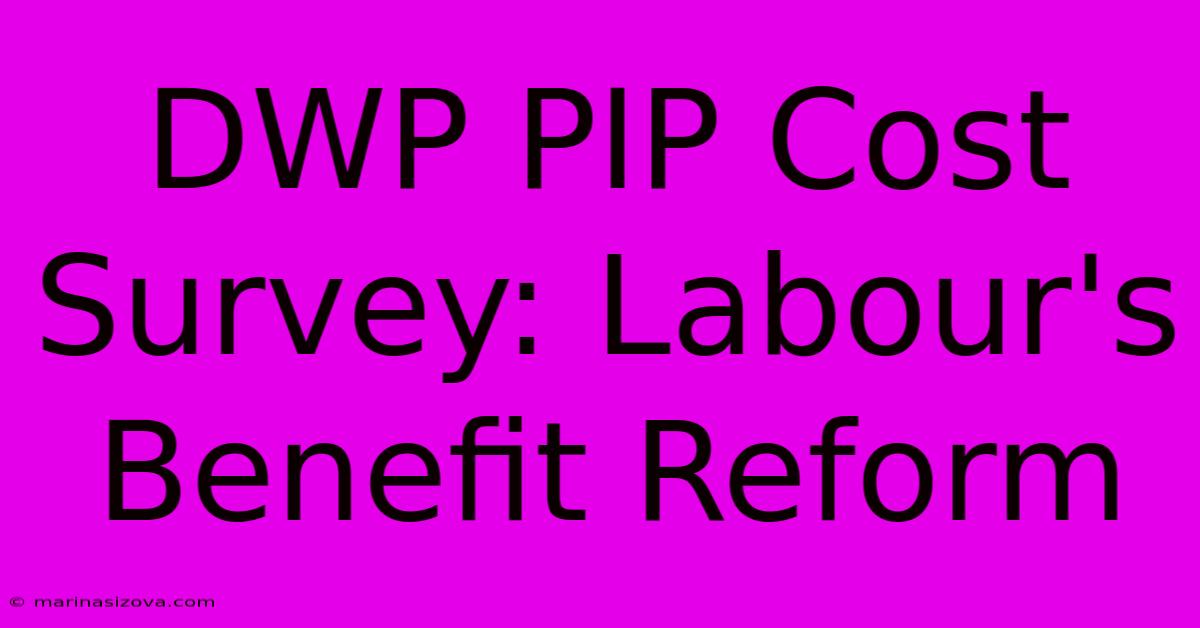DWP PIP Cost Survey: Labour's Benefit Reform

Discover more detailed and exciting information on our website. Click the link below to start your adventure: Visit Best Website. Don't miss out!
Table of Contents
DWP PIP Cost Survey: Labour's Benefit Reform Under Scrutiny
The UK's Department for Work and Pensions (DWP) is facing mounting pressure over its handling of the Personal Independence Payment (PIP), a benefit intended to support individuals with disabilities and long-term health conditions. A recent survey conducted by Labour Party has thrown the spotlight on the escalating costs associated with PIP assessments, sparking debate about the effectiveness and fairness of the system.
The DWP PIP Cost Survey: Key Findings
The survey, which analyzed DWP data, revealed that the cost of processing PIP claims has skyrocketed in recent years. Here are some of the key takeaways:
- Higher Costs for Assessments: The cost of carrying out assessments for PIP has surged, exceeding £1 billion in 2022-23, a significant increase from £600 million in 2016-17.
- Increased Backlogs: The number of outstanding PIP claims has also risen dramatically, reaching 200,000 in 2022-23. This backlog creates delays for claimants and adds further strain on the DWP's resources.
- Cost of Appeals: The cost of handling appeals against PIP decisions has also increased, indicating widespread dissatisfaction with the system and the need for re-assessments.
Labour's Criticisms: Concerns Over Fairness and Efficiency
Labour has been vocal in criticizing the DWP's management of the PIP system, highlighting concerns about its fairness and efficiency. Key points raised by Labour include:
- Lack of Transparency: Labour claims that the DWP lacks transparency regarding the actual cost of PIP assessments, making it difficult to assess the value for money.
- Unnecessary Assessments: Concerns have been raised about the need for repeated assessments, leading to unnecessary stress for claimants and increased expenditure.
- Poor Customer Service: Labour has highlighted issues with the quality of customer service provided by the DWP, citing delays in processing claims and a lack of support for vulnerable individuals.
DWP's Response: Focusing on Efficiency and Support
The DWP has defended its approach to PIP, emphasizing its commitment to providing support to those who need it. They have highlighted measures taken to improve efficiency, such as:
- Digital Transformation: The DWP is investing in digital technology to streamline processes and reduce administrative burden.
- Enhanced Training: Training programs for assessors are being implemented to ensure a consistent and accurate assessment process.
- Improving Communication: Efforts are being made to enhance communication with claimants and provide clear information about the PIP system.
The Way Forward: Ensuring a Fair and Efficient System
The DWP PIP cost survey has highlighted the need for a comprehensive review of the system. Both political parties agree that ensuring the fairness and efficiency of PIP is paramount. Moving forward, the following steps could be taken:
- Independent Review: An independent review of the PIP system could provide valuable insights into the current challenges and potential areas for improvement.
- Transparency and Accountability: Increased transparency regarding the cost of assessments and a clear framework for accountability could build trust in the system.
- Investment in Resources: Adequate funding and resources are essential to support the efficient and timely processing of PIP claims.
- Support for Claimants: Increased investment in support services for claimants could help navigate the complex PIP system and ensure they receive the necessary assistance.
The debate surrounding PIP and its cost remains a crucial one, touching on critical issues of social justice and effective government spending. The DWP and Labour are committed to finding solutions that ensure a fair and efficient system that provides vital support to those with disabilities and long-term health conditions.

Thank you for visiting our website wich cover about DWP PIP Cost Survey: Labour's Benefit Reform . We hope the information provided has been useful to you. Feel free to contact us if you have any questions or need further assistance. See you next time and dont miss to bookmark.
Featured Posts
-
Nikolow Zweifel An Wahlen In Duisburg
Oct 29, 2024
-
New Disability Benefits Labours Reforms And Dwp Survey
Oct 29, 2024
-
Kvinne Pakjorte 18 Aring I Bergen Sentrum
Oct 29, 2024
-
Autoneum Holding Vtx Autn Aktien Steigen Ertraege Sinken
Oct 29, 2024
-
Musiala Reflects On Bayerns Barcelona Loss
Oct 29, 2024
